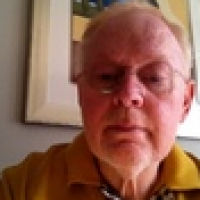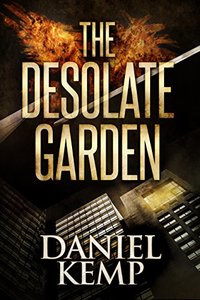Daniel Kemp Interview Published on: 18, Oct 2023
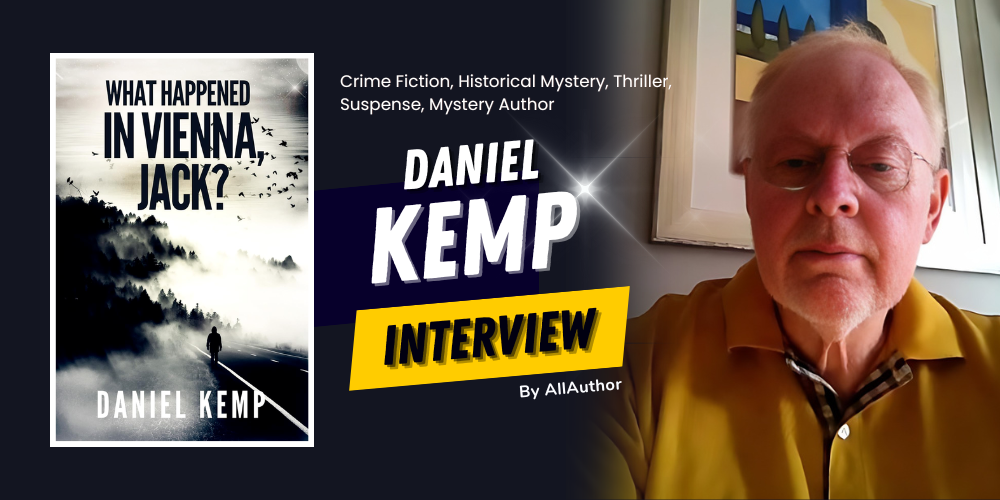 Where were you born? Which is your favourite childhood memory?
Where were you born? Which is your favourite childhood memory?
I was born in Kings Collage Hospital in Camberwell which is in South-East London. My favourite memory must be about my father. At the end of WWII, he was attached to a military intelligence unit interviewing Axis troops in Italy. On his return to the United Kingdom, he applied to join the Metropolitan Police only to be turned down because of his one false tooth! The police in London had the choice from so many returning British Forces personnel, that such a small inadequacy was deemed to be undesirable in a perfect police force. In many ways, that decision was lucky for both of us as Kemp senior was offered a position in the then War Office in Whitehall, where he took me, his only child, on several occasions and it was here that my interest in espionage started to grow.
When I finally had to give up playing on the various lush or muddy fields provided by the educational authorities under whom
I studied, where my ability at rugby was noted more than my academic ability, I also had to say goodbye to the venues where the opposite sex was known to assemble, as I signed on for the same Metropolitan Police at Scotland Yard that my father had applied to join. However, I had the kind of qualifications, and teeth, that quickly led to my appointment inside the Criminal Investigation Department, or CID as it is more commonly referred to. And here is where my father’s influence took hold. I was recruited into a branch of the CID, called C1I, a criminal intelligence gathering unit. In a serendipitous way, the collection of secrets had gone full circle.
At the time of my birth my father was a serving army officer stationed at the Royal Artillery Barracks Woolwich, which is quite some way from Camberwell. I do not know why my mother was taken all that distance to give birth to me as it was never spoken of and I was too engrossed in myself to ask her.
Can you share more about your early exposure to espionage due to your father's role in the War Office? How did this influence your interest in the genre?Yes, certainly. My father would tell me stories of his time interviewing captured German and Italian troops in Italy after that country surrendered to the Allies before the eventual end of World War II in the rest of Europe. As I’ve previously said, at the end of the war he transferred to work in what was then called The War Office before it changed its name to the Ministry Of Defence. He told me stories that he had either read about, or was actually involved in whilst being in those places.
You had diverse career experiences, from a police officer to a licensed taxi driver. How did these experiences shape your writing and storytelling?I think the only answer I can give you is that I learned to listen to other people. The expertise that gave me was an ability to write a structured conversation. I’m not sure if that comes across each time, but I hope it does.
Could you elaborate on the road traffic incident that led to your PTSD and eventual transition to becoming a writer? How did writing help you cope during that period?This one’s difficult, as I try my best never to visit the place in my mind where I have parked the memory of that incident. I can only hope that does not sound too melodramatic, it’s not meant to sound that way. You see, I avoid that question whenever I can.
At no time did I set out to become a writer, or a teller of stories. Sadly, I was never academically minded. My dream was always to play rugby for England. Better still score the winning try against France in a World Cup final. The accident, or whatever name it was called, left me lying in a bed in hospital for some wasted time, it then left me useless at home. I did become proficient at one thing; being able to sit in a chair for lengthy periods of time.
I began to write because I was bored. I found that writing gave my inner self something to think about other than the black things I kept trying to bury. My thoughts were taken away from those dark holes where I had put the pain of what happened to make me depressed and suffering from anxiety. There was a mixture of things I learned as I went through that unpleasant episode in my life, two of which were of particular importance. I learned I was vulnerable. I was not going to walk through any more brick walls and the only person who stayed with me throughout all that time, maybe five or six really tough, sh…y years is my real and only friend.
You ask—How did writing help you cope during that period?Although my answer may sound as though I’m exaggerating it is nevertheless true; writing gave me back a life. Whatever grammar I’d learned through schooling had disappeared and my efforts at punctuation were simply a joke. I thought a comma was great at decorating a page but useful for nothing else. I’d had a very good academic grounding, but as I’ve said, my mind was a long way away from a cosy life elsewhere.
However, at the age I was, sixty-three or sixty-four, I managed to learn new ways. As far as the punctuation goes I’m happy to leave that to a proofreader, and my grammar, although vastly improved, is checked by the same proofreader and then checked again by an editor.
Your debut novel, "The Desolate Garden," gained significant attention and was even optioned for a film. How did it feel to see your work receive such recognition? What did you learn from the film option experience?How did it feel? The feeling was far from normal. I will never forget driving home in the pouring rain from the lunch meeting I'd just had with the film producer who gave me a cheque for a thousand pounds, there and then and agreed to pay me the same amount for each year they wanted to render my story into this thirty million dollar film that was spoken about. I think the strongest feeling I had was a feeling of being lost. My world had been turned upside down with the calibre of money I was in line to receive. As soon as the first camera went—-click, I was to receive three hundred thousand pounds. If that was not enough, I was to get 3% of any net profits. But on the other hand, nothing had changed. It was pouring rain and the traffic was horrendous trying to drive away from central London to where I lived in Wilmington, Kent.
Because of that film deal, I was invited to do roughly twenty book signings for Waterstones, the major bookseller in the UK.
There had also been coverage in the London evening newspaper that someone on Twitter drew my attention to —- I knew nothing of it. Sometime after that, I had an email inviting me to a live appearance on the main London 6 o’clock evening television news channel, and there were loads of requests to do interviews on live podcasts and Blogs.
Most of those invitations came from America which left me with a feeling to explain something to them. I had to tell them I had a voice more like Michael Caine than Michael York. I’m a Londoner, after all. I’m not a Lord from the Yorkshire countryside, as is my chief protagonist in the Desolate Garden.
Your books often fall into two series: The Heirs and Descendants Series, and The Lies and Consequences Series. What inspired these series and their themes?Both series came about as my writing progressed. I wrote the sequel to The Desolate Garden first and then had nothing to occupy my mind other than to publicise the two books. I’m like a lot of others in finding that whole process to be soul-destroying. It’s completely anti-creative. So I wrote a short story, publishing it myself on Kindle Direct. It received quite a few fair reviews, which I found not only very encouraging but stimulating as well. So instead of the repetitive Twitter advertising I was doing, I opened a blank page and the short story—What Happened in Vienna, Jack? grew into a book that started the fictional career of Patrick West, a detective constable in London. The ensuing series of four books, titled Lies and Consequences, follows West as he travels around the world countering threats to the security of Great Britain and the West in general, until he reaches the dizzy heights of Chairman of the Joint Intelligence Committee, where he is waiting for a call-to-arms.
”What Happened In Vienna, Jack?" became a bestseller on multiple Amazon sites. What do you think contributed to its widespread popularity?I think a lot of it was due to the amount of advertising I did for the novel. I remember I was on Twitter for most of the day as well as part of the evening, but because I was exceeding the limits that are imposed on Twitter, I was barred from tweeting for quite some time. The same applied to the number of memberships I had in FaceBook groups. There are roughly one-hundred groups where I do nothing but advertise. I haven’t advertised, or been near any of them, for what I think must be over a year.
You’ve explored a wide range of genres and topics in your writing. Can you tell us more about the decision to step outside your comfort zone and tackle a new, more personal subject matter in your upcoming novel?This last exercise of writing (I haven’t a title yet) started life once again as a short story, but even though it was full of mistakes it remained a favourite of mine. It touches upon: what we are and what some people can become. It would not be right for me to say who it was, but someone in my past was sexually abused by her father, when very young. But it didn’t end with her. Both younger sisters were. The woman who is telling the story I’m writing, has been treated in a similar manner by a member of her family. Of course, my character is fictional, nevertheless, I encountered a secret kept for years from me by a person I thought I knew all there was to know. I started to wonder how many more are there who silently suffer that kind of abuse. Perhaps the passage I am trying to write about can resonate with some of them. Overall I thought the original story deserved to be, first corrected, and second, well, I shall try to do the story justice.
You announced your retirement from writing but have now embarked on a new novel. What motivated you to return to writing after your retirement announcement?The telling of stories and the writing of them has its teeth into me. If for no other reason than it fills my time and somehow or other I think I owe to the characters who become my friends, as well as the few who become, well, not so friendly, inside the book. I’m no different from many fiction writers in as much as I live inside the characters that I fabricate and it’s their story I tell. I write the story, but they are telling it from their hearts. That statement will make sense to someone who writes fiction with a strong character-led story, but for other people, it might sound as though I’m a demented old fool, who should never have been let out of the asylum.
Could you share a bit about the challenges you've faced as a writer, both creatively and in the publishing industry, and how you've overcome them?I think the most daunting challenge was the one I have never overcome. It was my failure to understand the publishing industry in general and the role some of those who have been involved inside it can scam people like the person I was. You see was just a gullible individual who had found something to occupy my mind. I sent about a hundred emails of inquiry to literary agents attaching a synopsis and the first three chapters of a novel, if that was what was asked for. That work did find an agent who said he knew an editor who would work on my novel. She would only charge £300.00, he said. I had no idea if that was a good price or not so I paid. It was only after that book was found by the film producer that I knew how many mistakes were in the book that was being sold with them still inside. The books were printed on demand so I asked the publisher to change the print and he said they would do it for some astronomical amount of money, which I had no option but to pay. I paid, but, by then, I must have lost a countless number of potential readers of my following work because of no other reason than the mistakes both the editor and I had made.
What legacy would you like your writing to leave behind, both for your readers and for the literary world as a whole?This wasn’t on my mind when I did start, but after the first story was published I did think that being the only son did not now mean my father’s line of the Kemp lineage would be made redundant, on my death. The books stay alive, even if just in the London Library where there’s a copy of each one. Maybe one or two will remain in other collections, but busy lives mean fewer people read paper books now, so, as a consequence home collections have become less.
When did you join AllAuthor? What do you think of the experience so far? Do you have any feedback?I think I have been with AllAuthor for perhaps seven or eight years, on and off. I always find the experience of posting advertising material open and without complications or hidden fees. What they say they will do— they do! I have run a few marketing efforts through them and I believe that’s helped establish my presence on social media, which nowadays is replacing the old WOM, word-of-mouth marketing. It all works around the word ‘trust.’ If, as a writer, you find somewhere, or someone, you can trust to do your advertising, then you stay with them. That’s my attitude towards AllAuthor. What they say they will do,—they do.
Share Daniel Kemp's interview
Daniel Kemp is a distinguished seventy-four-year-old author, celebrated for his literary contributions and international success. His captivating journey into the realm of espionage was ignited at a young age, influenced by his father's role at the War Office in Whitehall, London. Daniel Kemp's literary legacy continues to evolve, leaving readers and enthusiasts eagerly anticipating the next chapter in his remarkable career.
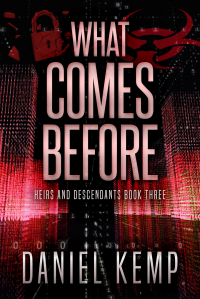 What Comes Before (Heirs And Descendants Book 3)
Genre: Thriller, Suspense, Mystery, Historical Fiction
What Comes Before (Heirs And Descendants Book 3)
Genre: Thriller, Suspense, Mystery, Historical Fiction
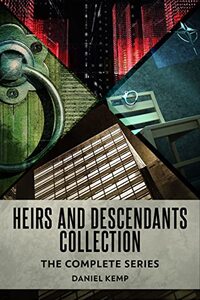 Heirs And Descendants Collection: The Complete Series
Genre: Thriller, Suspense, Mystery, Action & Adventure
Heirs And Descendants Collection: The Complete Series
Genre: Thriller, Suspense, Mystery, Action & Adventure
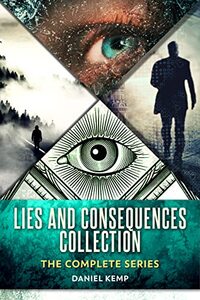 Lies And Consequences Collection: The Complete Series
Genre: Thriller, Suspense, Mystery, Action & Adventure
Lies And Consequences Collection: The Complete Series
Genre: Thriller, Suspense, Mystery, Action & Adventure
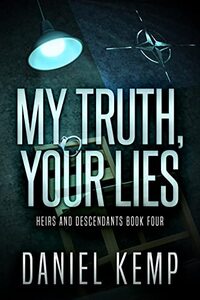 My Truth, Your Lies (Heirs And Descendants Book 4)
Genre: Thriller, Suspense, Mystery, Action & Adventure
My Truth, Your Lies (Heirs And Descendants Book 4)
Genre: Thriller, Suspense, Mystery, Action & Adventure
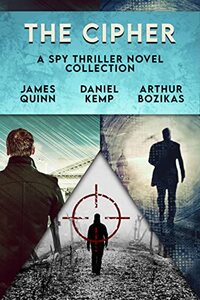 The Cipher: A Spy Thriller Novel Collection
Genre: Crime Fiction, Thriller, Suspense, Mystery, Action & Adventure
The Cipher: A Spy Thriller Novel Collection
Genre: Crime Fiction, Thriller, Suspense, Mystery, Action & Adventure
